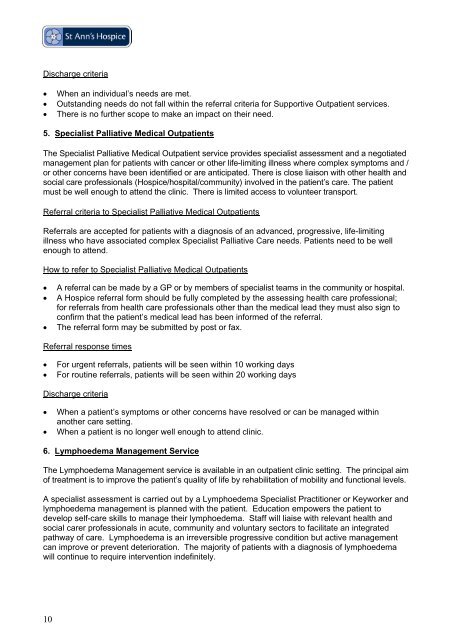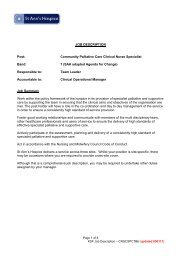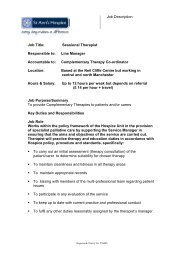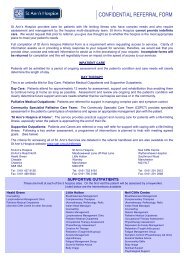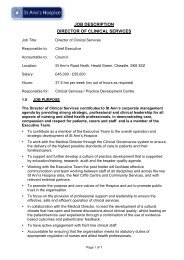Referral Criteria - St Ann's Hospice
Referral Criteria - St Ann's Hospice
Referral Criteria - St Ann's Hospice
Create successful ePaper yourself
Turn your PDF publications into a flip-book with our unique Google optimized e-Paper software.
Discharge criteria• When an individual’s needs are met.• Outstanding needs do not fall within the referral criteria for Supportive Outpatient services.• There is no further scope to make an impact on their need.5. Specialist Palliative Medical OutpatientsThe Specialist Palliative Medical Outpatient service provides specialist assessment and a negotiatedmanagement plan for patients with cancer or other life-limiting illness where complex symptoms and /or other concerns have been identified or are anticipated. There is close liaison with other health andsocial care professionals (<strong>Hospice</strong>/hospital/community) involved in the patient’s care. The patientmust be well enough to attend the clinic. There is limited access to volunteer transport.<strong>Referral</strong> criteria to Specialist Palliative Medical Outpatients<strong>Referral</strong>s are accepted for patients with a diagnosis of an advanced, progressive, life-limitingillness who have associated complex Specialist Palliative Care needs. Patients need to be wellenough to attend.How to refer to Specialist Palliative Medical Outpatients• A referral can be made by a GP or by members of specialist teams in the community or hospital.• A <strong>Hospice</strong> referral form should be fully completed by the assessing health care professional;for referrals from health care professionals other than the medical lead they must also sign toconfirm that the patient’s medical lead has been informed of the referral.• The referral form may be submitted by post or fax.<strong>Referral</strong> response times• For urgent referrals, patients will be seen within 10 working days• For routine referrals, patients will be seen within 20 working daysDischarge criteria• When a patient’s symptoms or other concerns have resolved or can be managed withinanother care setting.• When a patient is no longer well enough to attend clinic.6. Lymphoedema Management ServiceThe Lymphoedema Management service is available in an outpatient clinic setting. The principal aimof treatment is to improve the patient’s quality of life by rehabilitation of mobility and functional levels.A specialist assessment is carried out by a Lymphoedema Specialist Practitioner or Keyworker andlymphoedema management is planned with the patient. Education empowers the patient todevelop self-care skills to manage their lymphoedema. <strong>St</strong>aff will liaise with relevant health andsocial carer professionals in acute, community and voluntary sectors to facilitate an integratedpathway of care. Lymphoedema is an irreversible progressive condition but active managementcan improve or prevent deterioration. The majority of patients with a diagnosis of lymphoedemawill continue to require intervention indefinitely.10


